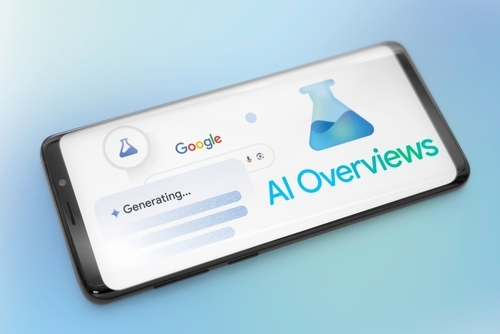With Google’s AI summary, consumers are less likely to click through to websites, a Pew Research study finds.
A new Pew Research Center study confirms what retail marketers have likely known for the past year: When Google shows consumers an artificial intelligence-generated summary at the top of search results, they are less likely to click on a link on the page.
In Q2 2024, Google began rolling out “AI overviews” at the top of search results which displays a summary answer to the query. Google now displays the feature to millions of U.S. users.
Pew Research Center analyzed the search data from 900 U.S. adults between March-April 2025, across desktops and mobile devices, totaling roughly 68,900 searches.
When Google presented consumers with AI summary results, those users clicked on a search results link on 8% of all visits, compared with 15% of consumers who clicked on a search results link when there was no AI summary at the top, according to the study.
In fact, 26% of Google users who saw an AI summary ended their browsing session on that page, compared with 16% of Google users who ended their search and didn’t see an AI summary.
This means fewer consumers are clicking through to websites, and retailers’ web traffic from organic search has decreased.
“We’ve seen a clear decline in organic search traffic, especially for ‘how to’ and ‘what is’ queries that drive category and informational content. That’s been a slow burn for years, but it’s accelerated recently,” said Brian Klais, SEO expert and CEO of app linking vendor URLgenius. “Even top-ranking content is often pushed below AI summaries, carousels or other Google-native features, which means fewer users are clicking through.”
But Google’s AI summaries aren’t all to blame for decreasing organic search traffic, Klais said. Overall, consumers are clicking less, scanning more and searching for information in other places beyond Google, such as social media and generative AI conversation tools like ChatGPT, Bard and Perplexity. In a separate study, Pew Research finds that 34% of U.S. adults have used ChatGPT, according to a survey in March 2025, compared with just 18% July 2023.
Retailers need to prepare for continued decreasing organic search traffic
Google’s recently announced AI mode — which turns Google into a chatbot interface where consumers can ask complex questions — will only further disrupt retailer web traffic.
SEO consultant Stephan Spencer predicts that Google will move its entire experience over to AI Mode within the next year, which will hamper retailers in promoting products.
“There will be a zero click search that the user will say, ‘Oh, great, now I got my answer.’ And you won’t have the opportunity to soft sell or cross sell or upsell or anything, and all your brand positioning will be not present, and that’s the future, ” Spencer said.
For merchants that rely on web traffic from organic search, now is the time for fast iteration, Klais said. Brands need to ensure their content is “AI-ready” and invest more in creator-centric commerce to have content show up in multiple discover engines.
“From an AI-readiness perspective, brands need to structure their content for semantic understanding, modular formats, clean product metadata, and a strong knowledge graph,” he said. “The goal is to make it easy for AI to use your information, not just crawl it.”
Spencer recommends for a brand to focus on one platform, whether that’s ChatGPT or Google AI Mode, and determine what the tool already knows about the retailer and its products. Then, a merchant can work to see how it can be cited and which keywords and questions its content needs to answer.
These tactics will help to ensure consumers are still discovering brands and their products, even if there are fewer consumers clicking through. For shoppers who do click, brands need to provide a relevant experience immediately, Klais said.
“The brands that win in this new landscape won’t just adapt their tactics, they’ll rewire how they think about discoverability, content and customer relationships altogether,” Klais said.
What Google’s AI summary cites as sources
According to Pew’s study, Google’s AI summary most frequently cited sources were:
- Wikipedia (6% of the time Wikipedia appeared in the first three source links of the AI summary)
- Government (.gov) websites (6% of top three source links)
- Reddit (5%)
- News websites (5%)
- YouTube (4%)
Overall, the source links are similar to the first page of Google’s traditional search results. Although, the AI summary more frequently cites government website (6% of the time in AI summary vs. 2% of first page of traditional results), and it does not source YouTube as frequently (4% AI summary vs. 8% traditional.)
Overall, Wikipedia, YouTube and Reddit accounted for 15% of the first three source links in the summary. This is in line with Google’s traditional search results, in which the search engine these three websites collectively are 17% of sources listed on the first page.
Pew also found that 18% of Google searches in March 2025 produced an AI summary. Of these, 88% cited three or more sources, and only 1% cited a single source. Pew also found that the longer the search query, such as using full sentences or asking a question, the more likely Google presented an AI summary. For example:
- 60% of search queries that began with question words such as “who,” “what,” “when” or “why” resulted in an AI summary.
- 53% or searches with 10 words or more generated an AI summary.
- 36% of searches that included both a noun and a verb generated an AI summary.




